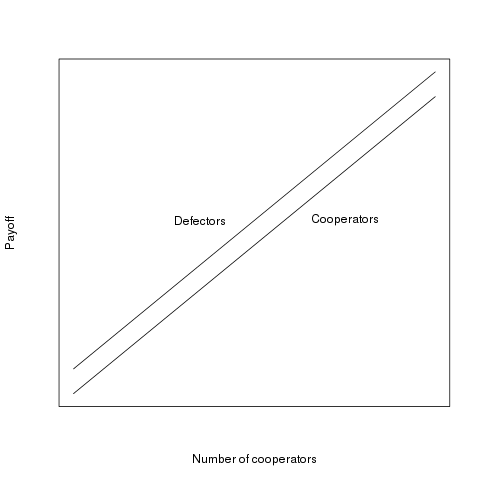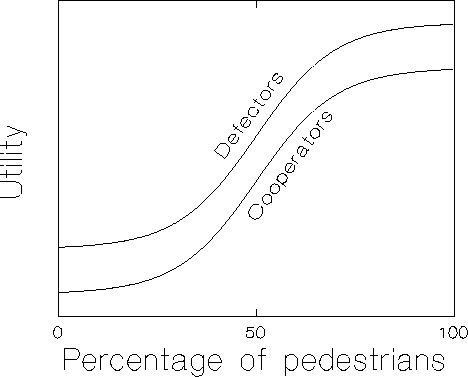Social dilemmas: conflict between self and others


You write C or D on a piece of paper. If you write C, I give everyone else $1. If you write D, I give you $1.
If everyone else does the same thing, how does this choice affect you?
How does it affect others?
What would you do if this were real? What proportion of others do you think would write C?
How would you feel if you wrote D and everyone else wrote C? What if you wrote C and everyone else wrote D?
What would you like others to do? How could we change the rules to get them to do that?


Fear of being a sucker.
Reciprocity: desire to punish defection and reward cooperation.
Conformity. Perhaps a good heuristic.
Social norms (Bicchieri): contingent on expectations and behavior of others; costly; not the same as convention.
"We won't lose [answers Yossarian]. We've got more men, more money and more material. There are ten million men in uniform who could replace me. Some people are getting killed and a lot more are making money and having fun. Let somebody else get killed."
"But suppose everybody on our side felt that way."
"Then I'd certainly be a damned fool to feel any other way. Wouldn't I?"
From Catch 22, Joseph Heller
"We must protect our planet. Turn off your computer!" (betty.happy@yandex.com)
Reducing our personal carbon footprint is not enough:
Voting vs. individual acton: Lower cost/benefit ratio for altruism, but higher for self-interested action.
By design, political action is a relatively efficient way to promote the interests of all, and an inefficient way to promote self-interest.
This is more true, the larger the circle of altruistic concern. E.g., future people.
A utilitarian voter would vote for what is best for all in the long run.
Instead, people vote parochially (for their nation or generation), or for their self-interest. They may misunderstand the nature of political action.
Note that beliefs may be a secondary problem because of belief overkill.
Dictator game: Dictator selected for better performance on homework. 7 Swiss Francs. Gave 34.6%.
Gangster game: Left 24.1% for other player.
Democracy game: Vote on amounts for other player. Gangsters increased to 42.2%, closer to what they judged to be fair. (Dictators did not increase significantly, but had less distance to go.)
The probability of being decisive vote is about 1/N, so expected utility of voting is the expected difference divided by N (the number of voters). In a national election in the U.S., that could be 100,000,000. If you stand to gain $1,000,000 if your candidate wins, the EV of voting is thus one cent.
But this analysis assumes self-interest only. If you count altruism or moralistic reasons, things are different. But, if you count altruism, why limit it?
Quattrone and Tversky (1984):
When subjects in a two-person prisoner's dilemma were told that their partner had defected, 97% of the subjects defected too.
When they were told that their partner had cooperated, 84% still defected.
But when they did not know what their partner had done, only 63% defected.
"Suppose you are an ocean fisherman. The kind of fish you catch is declining from over-fishing. There are 1000 fishermen like you who catch it. The decline will slow down if the fishermen fish less. But, of course, you will lose money if you cut back. Nobody knows how much fish you catch. .... If nobody cuts back, then everyone can keep fishing at roughly their current rate for 2 years and then they will have to stop. Every 100 people who cut back to 50% of their current catch will extend this time for about a year. Thus, if 100 people (out of 1000) cut back this much, fishing can continue for 3 years, and if 200 people cut back, it can continue for 4 years. (It is not expected that many more than this will cut back voluntarily.)"
Would you cut back? Would cutting back "increase your income from fishing over the next few years?"
29% saw cooperation as helping them financially in the long run, although it clearly did not.
E.g., "If I cut back now, I would not have to face the fear of running out of fish to sell and I could keep staying in business for a longer time and everyone else would also benefit." "Because if we cut back, there will be more fish for 4 years of 3 years so it would be a greater profit."
Parochialism is an in-group bias in which people try to help their group even when the out-group harm exceeds the in-group benefit.
Historical examples are racism and sexism, but these are no longer respectable, so they require subtle experiments to detect.
Nationalism, however, is alive and well. It is as respectable as racism was in 1800.
Nationalism has some justification, but people's attachment to it may go beyond what is justified and thus lead to worse consequences in some cases.
Moral values, held whatever the consequences:
Moderators:
In-group cooperation increases when out-group is hurt (Bornstein and Ben-Youssef, 1994), even with arbitrary groups.
Average rate of contribution was 55%. Vs. 27% in control conditions, where the contribution did not affect the other group.
One determinant of the parochialism effect could be that the self-interest illusion is greater when an in-group is in competition with an out-group.
"My cooperation helps people who are X. I am X. Therefore it helps me." This kind of reasoning is easier to engage in when X is a salient property of a particular group than when it is "human."
Baron, J. (2001). Confusion of group-interest and self-interest in parochial cooperation on behalf of a group. Journal of Conflict Resolution, 45, 283-296.
Questions:
Those subjects who showed a greater parochialism effect for contributing showed a greater self-interest illusion when the gain for their group was a loss for the other group.
No illusion (self benefit) in a situation that is purely competitive (0 for own group, -4 for other group).
Asking people to do the calculations reduces the parochialism effect:
Two-group condition: "What is the net effect of your contribution on both groups, taking into account your contribution and all the gains and other losses in both groups, including yours?"
Shows causal effect from illusion to parochialism. (Reverse may happen too.)
Sometimes you may think that the voice of an individual doesn't count for much. "What does it matter if I join or not?"
While your membership in the Guild is confidential, management is very aware of the total number of members, so every member counts.
A union with more members can do more. It's as simple as that. ...
There's more protection for our jobs, our salaries, and our benefits.
Check out what the Guild won-including 9% wage increases-what it lost, and what it protected you from when the current contract was negotiated.
Group A is the people who live in your country.
Group B is the people who live in another country of the same size.
Both groups vote. Each nation has 10,000,000 voters.
| Proposal | Income for group A | Income for group B |
|---|---|---|
| 1 | increase by 10% | increase by 2% |
| 2 | increase by 0% | increase by 12% |
| 3 | increase by 6% | increase by 8% |
Which proposal[(s)] would you vote for [approve]?
1 2 3 1 & 2
1 & 3 2 & 3
Three levels:
Political action in favor of a group often hurts both the actor and humanity.
If people did the arithmetic, self-interest might conspire with utilitarianism to keep parochial voters at home and let the utilitarians run the world.
World vs. U.S.
Jim thinks that the main issue in the election is a tax on carbon fuels in the U.S. Jim thinks that the tax would be bad for the U.S. because of its effects on the economy, but would be good for the world on the whole because it would reduce the harm caused by global warming, harm that would fall mostly on other countries.
Self vs. (slightly) world and U.S.
Betty thinks that the main issue in the election is a tax on carbon fuels in the U.S. Betty thinks that the bad effects of the tax on the world and U.S. economy would slightly outweigh its long-term benefits in reducing global warming, but it would be good for her because she in the solar energy business.
Belief that politics is like a market. Some evidence for this from earlier studies.
Think that voting IS justified by self-interest (and do not see it as promoting morality).
Think that defense of self-interest is moral: norm of self-interest (Ratner and Miller, 2001).
Both self-interest voting and parochial voting may share a similar heuristic or norm, the idea of responsibility for one's own defense. (The "culture of honor" in all of us?)
Like other heuristics, this one may extend to a situation where it is inappropriate. In this case it is not totally useless, but almost.
(It may be more appropriate in protests designed to win the sympathy of others.)
Can we change the norms about when different kinds of action are effective and appropriate? Can people understand the efficiency arguments?
Social dilemmas are real.
Impediments are perceived unfairness and "do no harm".
Second-order social dilemmas can help: low costs.
Impediments here to utilitarian solution: parochialism, self-interest.
These are like naive theories. More understanding of the nature of citizenship might help. (So might approval voting.)